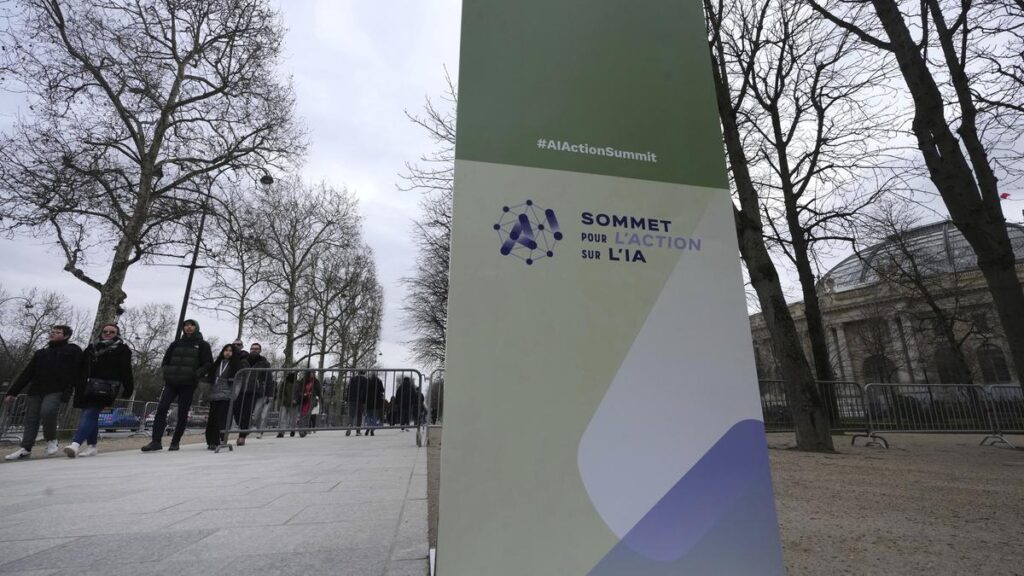
Venue for an upcoming AI Action Summit, in Paris.
| Photo Credit: AP
In early January, India accepted France’s invitation to co-chair the AI Action Summit on February 10 and 11 in Paris. This summit will be the third of its kind, following meetings focussed on AI safety in the U.K. (2023) and South Korea (2024). In addition to AI safety, the agenda at Paris is to focus on innovation, public interest AI, future of work, and AI governance issues — presenting India an opportunity to continue its global engagement on AI safety and also amplify the voice of the Global South on broader AI issues.
This article outlines how India can leverage the opportunity to advance three key priorities for the Global South. Doing this well could also strongly position India to host the next such summit, which brings together decision makers on AI policy, industry at the forefront of AI development, and civil society representatives for an inclusive dialogue on AI.
Voice of the Global South
The first meeting in Bletchley Park focussed on the safety of ‘frontier AI models’, the emerging risks of AI, and launched the U.K. AI Safety Institute (AISI). The second meeting in Seoul expanded the scope of the conversation to multilateral collaboration on AI risk management through a network of AISIs with countries/blocs such as the U.S., France, Singapore, Japan, and the European Union. With ministerial and high-level bureaucratic representation through the meetings, India has actively engaged in the global discourse on AI safety. As a next step, India’s IT Minister recently announced plans of setting up an AI Safety Institute.
In other multilateral fora with leadership roles, India has championed the cause for the Global South, which has not leveraged the transformative potential of AI as much as more developed parts of the world have. Under India’s presidency in 2023, the G20 endorsed a “pro-innovation regulatory/governance approach” to balance AI innovation and the need to develop guardrails for AI. Soon after, the Global Partnership on Artificial Intelligence (GPAI) meeting hosted by India in December 2023 emphasised the need for “equitable access to critical resources for AI research and innovation” to underscore the need for enabling AI infrastructure for developing AI applications.
Priorities in Paris
India’s vision for the Global South could now benefit from the broad agenda of the Paris meeting. To maximise this opportunity, India should focus on three key strategic priorities. First, India must advocate for democratising access to AI resources across the entire AI value chain. While India’s domestic initiative of establishing a common computing facility with over 18,600 GPUs and 40% government subsidy sets a compelling example, the scope must expand beyond computing hardware. This includes ensuring equitable access to data sets, data storage infrastructure, cloud computing platforms, foundation models, and application development platforms. In addition, India should promote distributed computing solutions, an alternative to traditional computing infrastructure, and access to innovative safety tools like watermarking technology.
The promotion of open-source AI models deserves particular attention. DeepSeek’s success demonstrates both the potential of open-source models and the need to address export control measures that currently constrain AI model development. India must advocate for more flexible cross-border transfer of AI technologies while maintaining appropriate safety standards.
Second, India should call for developing a framework for identifying and prioritising AI use-cases relevant to the Global South’s unique contexts. This approach ensures that AI applications serve local needs rather than becoming solutions in search of problems. Instances include early disease detection systems adapted to local healthcare infrastructure, personalised learning platforms that account for diverse educational contexts, and agricultural productivity tools calibrated to regional farming practices. The establishment of an AI use-case repository following the summit could provide guidance for the Global South in determining its priorities.

Third, India must emphasise the importance of contextualising AI risks and safety measures for the Global South. The challenges faced by developing nations often differ significantly from those of the Global North. Cultural erosion through exposure to large language models trained on “western data” represents one such unique risk. The Yoshua Benjio-led expert report on International Scientific Report on the Safety of Advanced AI highlights that risk is derived from the “probability of an occurrence of harm and severity of that harm.” Risks are thus future looking but grounded in already occurred harm. In Paris, India must thus call for collecting evidence of AI-related harms, grounded in Global South contexts, to inform their risk mitigation strategies. A repository of AI-related harms could also help inform any future regulatory approaches of the Global South.
Looking ahead
As co-chair of the Paris meeting, India must leverage its position to advance the key AI priorities of the Global South. Doing so would also position India as an ideal candidate to host the next AI Action Summit, which would ensure continued focus on the Global South perspective on AI. This would, in turn, cement India’s role as bridge between the AI superpowers in the Global North and developing nations catching up in the global AI sphere.
Shatakratu Sahu is a Senior Research Analyst, Technology and Society Program, Carnegie India
Published – February 10, 2025 12:15 am IST

